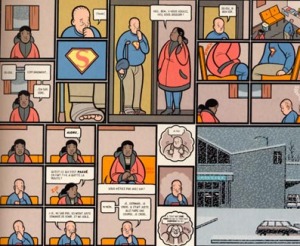Dear Weblog Superfans,
My #34 (Truly help a student) doesn’t really conform to the rules of the 101 in 1001 Big Idea in that it’s not very specific. You might ask, What does “help” mean? And rightly so: there’s no criteria for it; its ambiguity is contrary to the very notion of a 101 list, which is–at least in my mind–to establish a set of reachable goals. Goals that traditional resolutions, such as the New Year kind, in their audacity and fairly preposterous life-changing, revolutionary breadth, fall far short of establishing.
And then I went and put on #34 (as well as a number of others, I believe you might have noticed).
So. Here I present an argument as to why I have, indeed, accomplished this goal.
Background information: I established #34 thinking that I had plenty of time to do it–and I was right; I had exactly 1001 days. I would be working at my school’s writing center during that period and, hopefully (see #52), teaching on my own. Turns out I don’t need to have completed #52, although I might offer an update of #34 upon the completion of #52.
I worked at the writing center for about 12 months, and in that time, I have nominally “helped” hundreds of students. They came in with papers they’d written, or assignments for papers they hadn’t, and we talked about what they wanted to say and how well they had said it. Most of the time it was fine–not a job I would ever really apply to do full-time ever again, but something I think I was good at and enjoyed on a moderate level. Writing is, after all, MY LIFE!!!!!1.
But there are a few students who I believe I helped more than most. And that’s what I wanted to do here: help someone with something more than a paper, or at least with understanding something that would go beyond whatever it was they were working on that day. In rough chronological order:
Student #1, Last fall (several times). A girl whose name I cannot spell, but which is pronounced Phone, came in several times to work on papers for her Freshmen Comp class. We worked on all sorts of things, and I enjoyed it when she came in. Phone was always happy and enthusiastic, and even if it took her a while to catch on to things, she did catch on, and she was excited when it happened. We conducted a few surveys in the WC to see how people were responding immediately after consultations, and on one of them–they were anonymous, but I’m sure it was her–wrote “Matt is the best!”
Student #s 2, 3, and 4, the Powerpoint Girls, also last fall. These three freshmen were in that same Comp class and had to give a presentation on an essay they had all read. They’d discussed it a bit in class, I think, and the three of them knew what the author was trying to say well enough to create this OK Powerpoint presentation on it, but it wasn’t all that exciting. And their discussion of it wasn’t all that deep. So we talked about the article (I can’t remember what it was about) and it came out that they actually didn’t understand it very well, because even though they picked up on his premise and understood the layout of his argument, there were too many jumps in logic for them to follow along with him. They told me what these jumps in logic were, fairly clearly I thought, but hadn’t discussed them anywhere in the Powerpoint. And so, very simply, I told them to talk about why the author messed up and how saying that is a perfectly valid thing to do. These girls, being freshmen, were astounded, I think, and they left seeming pretty excited about what they were now going to do. Namely, tear the author a new one.
Student #5, Esther, last spring. Esther was working on an application essay for medical school. I hate application essays. There are so many different ways to write them, and the students really don’t like hearing that. They want to be told exactly what to do and how to do it, or else they leave angry and never come back. But Esther wasn’t like that. She was very into the experimentation of it all, was never wedded to what she had written just because she had written it, and it was a lot of fun. There isn’t any big inspirational story here; she came back probably six times or so, and between each session she would work on the essay and make it better until we got to the point where the only things to really “fix” were the little grammatical ones. Which is exactly what the writing center is all about! Yay!
Student #6, Natasha and the Matt Method, this summer. Natasha was working on an essay on a novel for some class that should not have required its students to write essays on novels. Political science, I think, because the essay had to discuss how the novel was politically Platonic, which confused the hell out of her. And I had no idea what a politically Platonic novel was, really, so I was kind of stumped. But we talked about how her class discussed Plato and his philosophy (I figured it had something to do with the Republic, and she sort of remembered having to read that). So I just gave her a basic approach to try–list all the characteristics that Plato designates as good things for a government or society to have, and then list all the characteristics of the society in the novel, and then connect the characteristics in one column to the ones in the other. Not a mind-bending strategy, I didn’t think, but she came back in a few days with a written essay, all excited because my idea worked. So well, apparently, that she was now calling it the Matt Method. So there you go. I think I should patent it. Or whatever.
Student #7, George, this summer. George was working on a handful of short essays for medical school. These ones were a bit easier to handle than the bigger application essay is because they actually gave him questions to answer. So we went over the essay that he thought was his best. He had put most of his energy into that one, since it was the only mini-essay that that particular school required. And it was a mess. He had been reluctant to come in, he said, because he was nervous about losing his personal voice, so I trod gently at first. We went over general ideas for the first half of the session and kind of revamped the whole thing. Then he told me he wanted to go over it with a fine-tooth comb rather than doing the same general-idea thing for the rest. And so we picked apart every phrase that didn’t quite make sense and ended up with a pretty different essay in terms of language, but seemingly the essay that he had intended to write. I think he was pretty excited when he left, or at least aware of what he needed to do for the other essays to make them a bit better, as well. And when he left, he said, “You are damn good at what you do.”
Thus, Weblog Superfans, I am calling #34 complete.
Love
msb


